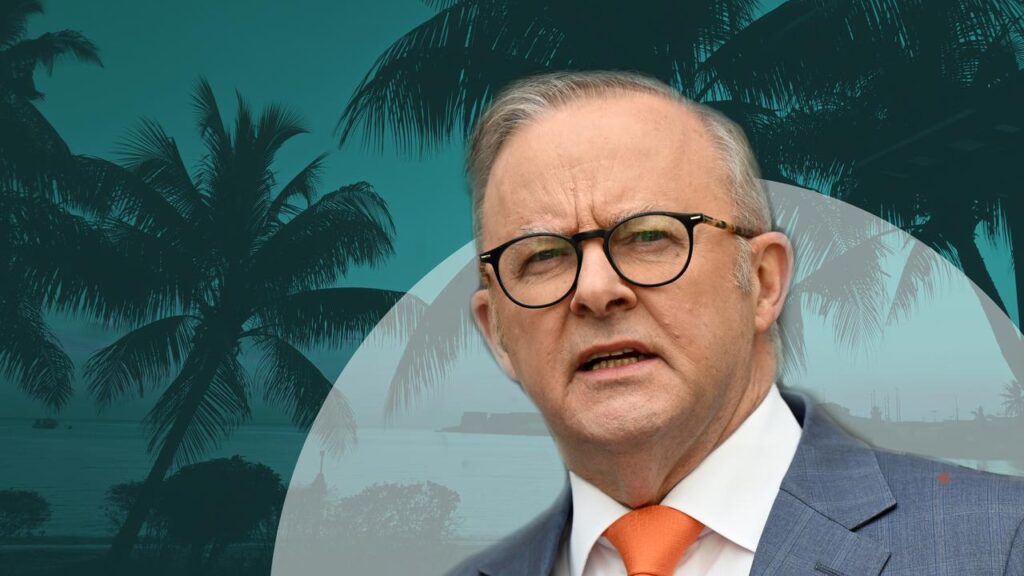Pacific snags could follow Albanese to Trump meeting
Lloyd Jones and Jacob Shteyman |

Anthony Albanese is being accused of prioritising “photo ops” over diplomacy after his failure to seal two major deals with Pacific nations risked derailing an upcoming meeting with Donald Trump.
Opposition Leader Sussan Ley said the prime minister had misrepresented the status of defence agreements with Papua New Guinea and Vanuatu by saying they were done deals before returning home empty-handed.
Mr Albanese left Port Moresby on Wednesday without a hoped-for defence pact with PNG after its prime minister, James Marape, failed to convene his cabinet to sign off on the landmark agreement in time.
Instead, the leaders only managed to put their signatures to a communique laying out the key tenets of the pact, which Mr Marape insists will be approved by cabinet shortly.
“With every piece of diplomacy, agreement making, you just have to do the work. And clearly that hasn’t been done because he announced that it was all achieved and when he got there it clearly wasn’t,” Ms Ley told Nine’s Today program.
Mr Albanese insists the delay in signing the defence treaty has “no downside”, brushing aside claims it’s an embarrassment for the government.
But the delay comes just more than a week after Mr Albanese also returned empty-handed from a visit to Vanuatu, failing to land a $500 million deal that would have given Australia veto power over Chinese investment in critical infrastructure.

“For the prime minister to rush over there and to use this just as a photo op, I think tells us that he isn’t doing the work, and it’s a real foreign policy failure, not just with PNG but with the $500 million deal with Vanuatu,” Ms Ley said.
The timing is unfortunate, given Mr Albanese is preparing to visit the United States next week for an expected first face-to-face meeting with Trump on the sidelines of the United Nations General Assembly.
The Albanese government risks being seen as having dropped the ball in Australia’s role as the US’s deputy sheriff in the Pacific.
The Trump administration has been leaning on Australia to boost its security presence as a bulwark against Chinese influence in the region.
The US expected Australia to maintain a strong security presence in the Pacific and the failure of its PNG and Vanuatu deals meant missed potential, Lowy Institute research fellow Oliver Nobetau told AAP.

“This could have demonstrated that Australia and Papua New Guinea – it sees itself as a big brother – can maintain regional stability within the Pacific,” he said.
The stalled agreements were probably going to reinforce US perceptions that Australia could do more when it came to security in the Pacific, Mr Nobetau said.
The government needed to go back to the drawing board to find a different diplomatic approach to instil confidence, especially among Melanesian nations, to sign on to such agreements, Mr Nobetau said.
Mr Albanese is also expected to raise the AUKUS trilateral security pact when he meets Mr Trump.
On Wednesday, Australia got unexpected support from King Charles, who was hosting the president at a state dinner at Windsor Castle in the UK.
During a speech, the King specifically mentioned the pact, which is being reviewed by the US to ensure it aligns with Mr Trump’s “America first” focus.

“Our AUKUS submarine partnership with Australia sets the benchmark for innovative and vital collaboration,” he said, as Mr Trump appeared to nod in agreement.
Under the $386 billion AUKUS deal, Australia is supposed to acquire three nuclear-powered Virginia-class submarines from the US in the early 2030s before a new fleet of boats is built for delivery from the 2040s.
The US is pressuring Australia to increase its defence spending to 3.5 per cent of gross domestic product.
AAP